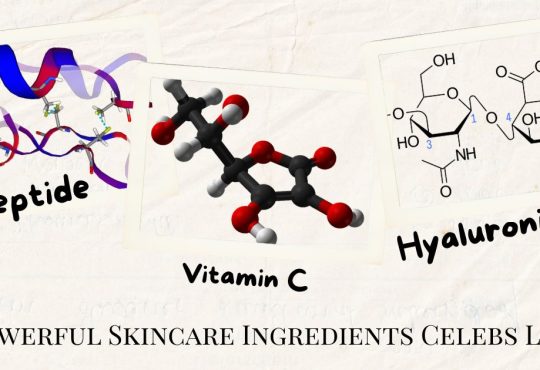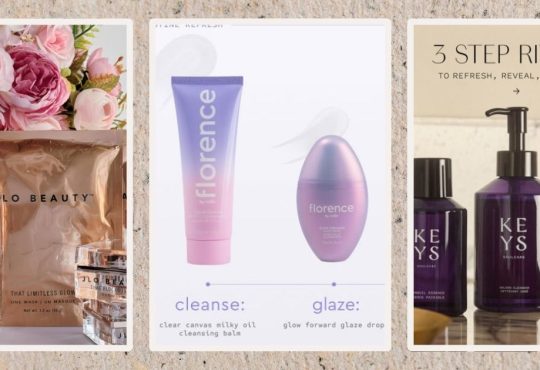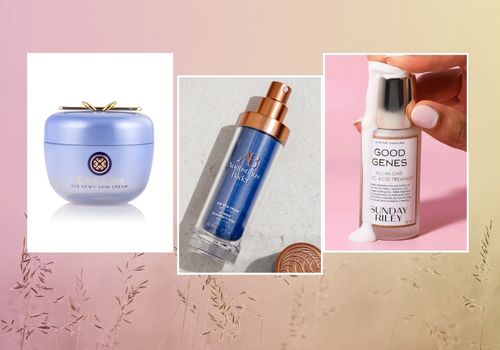When you glance in the mirror, do you wish your skin had smaller pores for a more appealing look? You can take several steps to minimize the appearance of pores, many of which you can easily do yourself. Clogged pores often result in acne, posing a common skincare challenge. Accumulating dirt, oil, or dead skin cells contributes to pore blockage, particularly among individuals with excessively oily skin. Adopting a gentle skincare regimen can effectively address clogged pores. This article will impart the pore-shrinking tips and intricacies related to enlarged or clogged pores. Read further!
Pore-Shrinking Tips: 7 Easy Ways for a More Appealing Look!
What exactly are clogged pores?
Clogged pores form due to the accumulation of oil, dirt, or dead skin cells, which become trapped within the skin’s pores, the tiny openings that allow oil and sweat to be released from glands. When these pores become blocked, it can lead to the development of acne and other skin issues. This occurrence is widespread on the face, but clogged pores can manifest on different body parts, including the scalp, neck, back, shoulders, and chest.
While clogged pores primarily affect facial skin, they can also arise in various areas across the body. The accumulation of debris within pores can disrupt the skin’s natural processes, leading to inflammation, blemishes, and discomfort. Understanding the causes and manifestations of clogged pores is essential for implementing effective skincare practices and maintaining healthy skin.
How do clogged pores differ from enlarged pores?
Clogged pores and enlarged pores represent separate but interconnected skin concerns. Excessive oil production by glands can lead to clogged pores, but enlarged pores can arise from various factors beyond oil production. Aging, the use of certain skincare products, hair follicles, and exposure to sun damage are among the many contributors to enlarged pores. It’s essential to recognize that while enlarged pores can coexist with clogged pores, the presence of one doesn’t always lead to the other.
Understanding the distinction between clogged and enlarged pores is crucial for developing targeted skincare strategies. While clogged pores primarily result from oil accumulation within pores, various factors can influence enlarged pores. By addressing the underlying causes of both clogged and enlarged pores, individuals can implement effective skincare routines to maintain clear and healthy skin.
Who is prone to clogged pores?
Clogged pores, like acne, are commonly observed in adolescents and young adults due to hormonal fluctuations that stimulate oil glands. Nonetheless, individuals of any age or gender may encounter clogged pores. Additionally, a family history of acne or clogged pores can increase the likelihood of experiencing similar skin issues, as genetic factors may contribute to the development of excessively oily or dry skin.
Understanding the role of hormonal changes and genetic predispositions in clogged pores is essential for effective skincare management. By acknowledging these underlying factors, individuals can tailor their skincare routines to address specific concerns and maintain optimal skin health regardless of age or genetic predisposition.
How widespread are clogged pores?
Clogged pores are highly prevalent, with approximately 50 million people affected by acne each year, with clogged pores being the primary cause.
Causes and Symptoms:
What leads to clogged pores? Various factors contribute to pore blockage, including accumulating dead skin cells, oil, or dirt. Potential causes encompass:
- Dry skin or excessive shedding of skin cells.
- Usage of facial products such as cleansers, lotions, or cosmetics.
- Medications altering oil gland activity.
- Increased oil production due to age, hormonal shifts, or genetic factors.
While certain factors don’t directly cause clogged pores, they can exacerbate the condition, such as:
- Certain dietary choices.
- Friction from clothing, backpacks, or helmets.
- Humid environments.
- Picking at blemishes.
- Environmental pollution.
- Stress or anxiety.
- Overzealous skin cleansing or exfoliation.
What are the indications of clogged pores?
Most individuals notice clogged pores when they manifest as the following skin issues:
- Whiteheads: Closed comedones appear as raised, flesh-coloured bumps on the skin’s surface.
- Blackheads: Open comedones result from widened pore openings and appear dark due to oxidation rather than dirt accumulation.
- Pimples and blemishes: Excessive dirt and oil within pores lead to redness, swelling, and inflammation, manifesting as various forms of pimples or boils. Pustules contain pus and result from severe pore blockage.
- Nodules and cysts: Severe pore congestion can cause deep skin swelling, pain, and inflammation, resulting in nodules or cysts.
How to avoid clogged pores:
Preventing clogged pores involves adhering to a personalized skincare regimen tailored to your age, skin type, and specific concerns. Consulting a dermatologist, a medical professional specializing in skin conditions, can guide suitable products and treatments.
Additional strategies to prevent clogged pores include:
- Refraining from touching your skin with unwashed hands.
- Avoid using facial oils like coconut, olive, or jojoba oil.
- Incorporating gentle exfoliation methods such as light scrubbing or periodic chemical peels.
- Maintaining cleanliness and hydration of the skin.
- Resisting the urge to pick or squeeze pimples, as this can exacerbate pore blockage and inflammation.
Tips for Skincare and Makeup Product Purchase:
Choose skincare and makeup items marked as non-comedogenic. Non-comedogenic products are formulated not to block pores, preventing them from expanding and making them more conspicuous. Ensure that any product you apply to your face contains one of the following terms:
- Non-comedogenic
- Oil-free
- Won’t clog pores
Avoid using the product if you don’t find any of these terms.
Tips for Skincare Routine:
Wash Your Face Twice Daily
Make it a habit to cleanse your face twice daily. Clogged pores and excessive oiliness can accentuate pore size. Cleansing morning and night helps to unclog pores, prevent blockages, and minimize oiliness. Follow these steps when cleansing your face:
- Use lukewarm water. Steer clear of hot water to avoid skin irritation and enlarged pores.
- Wash your face gently. Scrubbing too vigorously can cause skin irritation. And inflammation, making pores more visible.
- Opt for a mild, non-comedogenic cleanser. Prioritize products that won’t irritate your skin or clog your pores.
Use Retinol
Incorporate retinol into your skincare routine. If you have oily skin, experience mild acne, or notice decreased skin firmness leading to enlarged pores, using a product containing retinol or retinyl palmitate may be beneficial. For optimal results, apply the product before bedtime. It’s important to note that some people might encounter skin irritation with these products. To minimize this, wash your face and wait 30 minutes before applying the product.
Address acne promptly
Acne can lead to clogged pores, making them more visible.
Consider using a cleanser containing salicylic acid, known for its ability to unclog pores. Some salicylic acid cleansers are gentle and suitable for daily use.
Suppose salicylic acid causes dryness or irritation; alternate between cleansers. Use a mild, non-comedogenic cleanser in the morning and a salicylic acid cleanser at night.
For comprehensive acne management, many individuals require additional treatments beyond salicylic acid.
Use Sunscreen
Make sunscreen a daily essential for facial protection. Sun damage contributes to reduced skin firmness, accentuating the appearance of pores. Utilize a broad-spectrum, water-resistant sunscreen with SPF 30 or higher to protect your skin from dangerous UV rays. Apply sunscreen daily, regardless of weather conditions, as sun exposure accumulates damage over time.
Exfoliation
Try exfoliation to reduce the visibility of pores. However, it’s crucial to exfoliate safely to prevent skin damage. Watch the video “How to Exfoliate at Home Safely” to learn safe exfoliation techniques.
If you feel unsure or uncomfortable about exfoliating or if it’s suitable for you, consult a board-certified dermatologist. A dermatologist can assess whether exfoliation helps minimize pores and offer in-office treatments.
Handle your skin with care.
Harsh scrubbing techniques do not improve skin cleanliness; instead, they often result in skin irritation, which can worsen the visibility of pores. Furthermore, practices such as picking, squeezing, or digging into pores can aggravate skin irritation, exacerbating the appearance of pores. Hence, it is essential to prioritize gentleness in your skincare regimen. Refrain from vigorously scrubbing, rubbing, picking, or squeezing the facial skin to maintain health and minimize pore visibility.
Address sagging skin.
As we age, our skin naturally undergoes alterations that lead to decreased firmness and sagging, potentially leading to enlarged pores. This loss of firmness is a common aspect of aging and is often accompanied by other skin concerns. Consulting a board-certified dermatologist provides an opportunity for a comprehensive assessment of your skin’s condition and specific problems related to enlarged pores. Dermatologists can offer personalized recommendations for tightening solutions tailored to your needs and preferences through this evaluation.
Fortunately, numerous in-office procedures performed by dermatologists offer practical solutions for addressing sagging skin and minimizing the appearance of enlarged pores. These procedures are designed to rejuvenate and lift the skin, leading to a smoother and more youthful appearance. Notably, many of these treatments require minimal downtime, enabling every person to return to their daily routines with minimal interruption. By exploring the diverse options available, individuals can discover the most suitable treatment approach to achieve their desired skincare goals and regain confidence in their appearance.
Conclusion:
Clogged pores aren’t a cause for significant concern and are often resolved with appropriate skincare interventions. If you’re troubled by pimples or other blemishes resulting from clogged pores, it’s advisable to consult your healthcare provider. Seek medical attention if you experience painful, inflamed, infected, or pus-filled acne. Also, promptly contact your healthcare provider upon detecting unusual skin growths or lesions.





